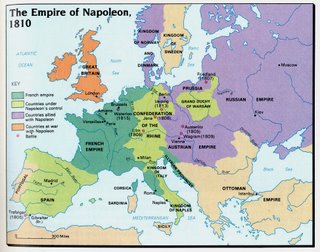Social 10
We finished watching "The Killing Ground" today in class. Please make sure that you have read and taken notes on the key terms in Chapter 7-9 for when we come back from Spring Break. We will be starting the Interwar Years when we come back from break.
Social 20
I had you do a worksheet on key terms from Chapter 9 "The Age of Bismarck" in Century of Change. I also assigned questions from Chapter 9 in the textbook that are due on Tuesday, April 4th. These are the questions that you are responsible for: Q1-3, Q11-13. Here is the study guide for your upcoming Nationalism Unit Final:
Nationalism Unit Final Study Guide:
This unit final is on Wednesday, April 5th. It covers material from Chapters 1-5, Chapters 8-9.
- Divine Right of Kings/Absolutism
- Philosophers (Voltaire, Locke, Rousseau, Montesquieu)
- The Old Regime
- Ideologies: Liberalism, Conservatism, Nationalism
- Causes of the French Revolution
- Key Events of the French Revolution (Estates-General, Bastille, Tennis Court Oath, Reign of Terror, etc.)
- Key People/Key Groups in the French Revolution
- Napoleon's Rise to Power (how? when? why?)
- Napoleon (goals, results, triumphs, contributions, events, overall influence on Europe and the World)
- Congress of Vienna (what was it? goals? representatives? was it successful?)
- Congress of Vienna: reactionary/conservative, legitimacy, balance of power
- Age of Reaction/Metternich
- Revolutions of 1830 and 1848 (where? why? what did they attempt to do?)
- Unification of Italy (significant leaders)
- Unification of Germany (how? leader?)
- Know your European geography (make note of maps in the textbook, Napoleonic Europe, unification maps of Italy and Germany, etc.)
Here are some questions to help you review. You should try to answer these questions.
Nationalism Unit Final Review Questions:
- For each of the following philosophers, briefly explain their philosophy. (Voltaire, Locke, Rousseau, Montesquieu). Pay special attention to their works, their views on the role of government, equality vs. inequality, common good vs. individual need.
- Quickly describe the ideologies of 19th century Europe: liberalism, socialism, nationalism, conservatism.
- List three fundamental causes of the French Revolution. (think of intellectual, social, political, and economic causes as well)
- Describe the political spectrum of the "new Republic" and list two major philosophies of each (radicals, moderates, conservatives, Girondins, Jacobins, etc.)
- Describe the following: Tennis Court Oath, Storming the Bastille, the Reign of Terror, the Declaration of the Rights of Man.
- Describe the following governments in the French Revolution: National Assembly, Legislative Assembly, National Convention, the Directory.
- Give three major examples of nationalism specific to the French Revolution.
- How did Napoleon achieve power?
- How did Napoleon maintain power? (three goals)
- What were Napoleon's major contributions and triumphs?
- What was the Continental System? Why did it fail?
- Describe the goals of the Congress of Vienna.
- Who were the representatives of each of the major powers at the Congress of Vienna?
- What does the term "balance of power" mean? Describe how this can/could be achieved.
- What did the Revolutions of 1830 and 1848 attempt to do? What caused these various revolutions to take place?
- The unification of Italy and Germany are both similar yet different. List two for each.
- After unification in 1870, Germany declared war on France. What was the result? What land did Germany take from France and add to their possession?
- Describe Otto von Bismarck's domestic and foreign policy.
